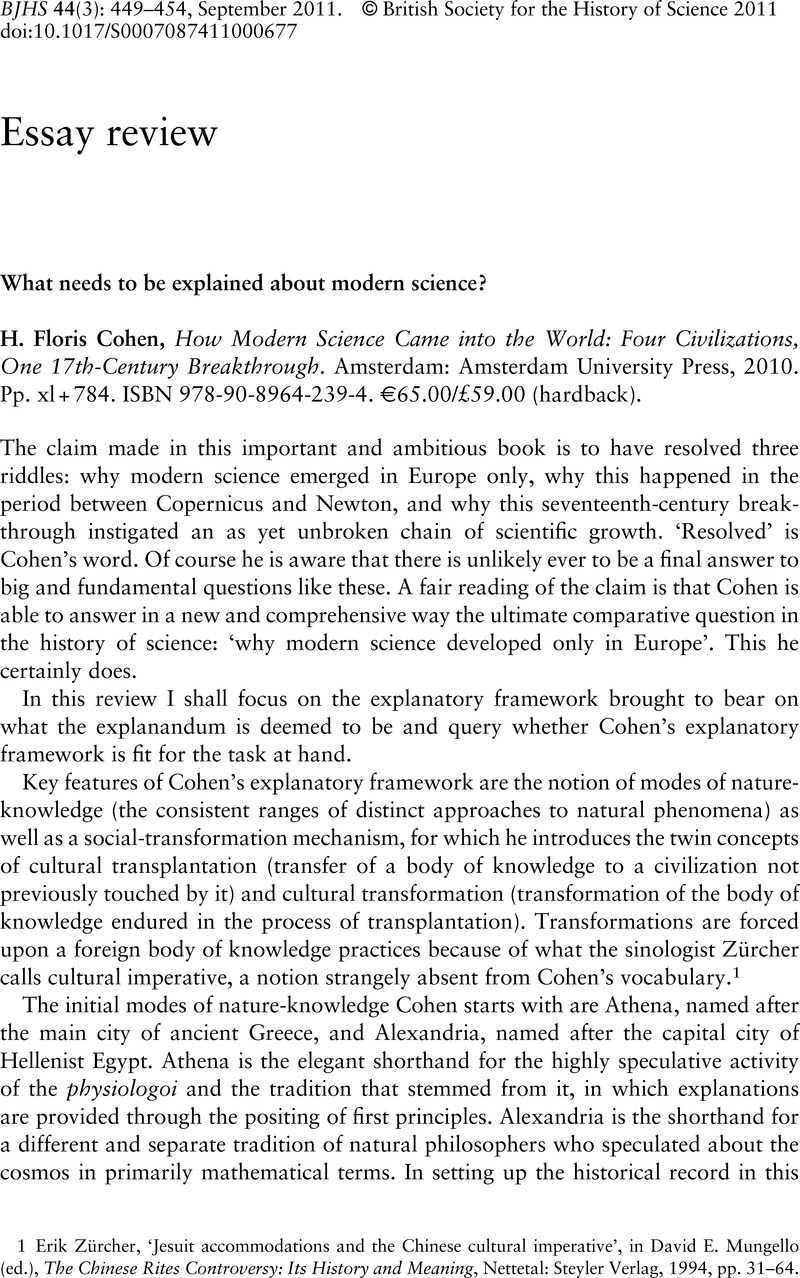Published online by Cambridge University Press: 08 September 2011

1 Erik Zürcher, ‘Jesuit accommodations and the Chinese cultural imperative’, in David E. Mungello (ed.), The Chinese Rites Controversy: Its History and Meaning, Nettetal: Steyler Verlag, 1994, pp. 31–64.
2 Dijksterhuis, E.J., The Mechanization of the World Picture, Oxford: Clarendon Press, 1961Google Scholar; Zilsel, Edgar, The Social Origins of Modern Science, 2nd revd edn, Dordrecht: Kluwer Academic Publishers, 2003CrossRefGoogle Scholar.
3 Needham, Joseph et al. , Science and Civilisation in China, vol. 5, Cambridge: Cambridge University Press, 1976Google Scholar, Part 3, p. 220.
4 Bacon, Francis, The Advancement of Learning, New York: Modern Library, 2001, p. 97Google Scholar.
5 Cunningham, Andrew, ‘How the Principia got its name: or taking natural philosophy seriously’, History of Science (1991) 29, pp. 377–393CrossRefGoogle Scholar; Cunningham, Andrew and Williams, Perry, ‘De-centring the “big picture”: The Origins of Modern Science and the modern origins of science’, BJHS (1993) 26, pp. 407–432CrossRefGoogle Scholar.
6 Huff, Toby E., The Rise of Early Modern Science: Islam, China and the West, Cambridge: Cambridge University Press, 1993, p. 321Google Scholar.
7 Morus, Iwan Rhys, When Physics Became King, Chicago and London: Chicago University Press, 2005CrossRefGoogle Scholar.
8 The notion of ‘reason's exemplar’ is found in Pyenson, Lewis, ‘The ideology of Western rationality: history of science and the European civilizing mission’, Science & Education (1993) 2, pp. 329–434CrossRefGoogle Scholar, 329; Adas, Michael, Machines as the Measure of Men: Science, Technology, and Ideologies of Western Dominance, Ithaca and London: Cornell University Press, 1989Google Scholar.
9 This is a well-known problem with comparative causal explanations. Jack Goody's claim that literacy is a causal agent has been found wanting on exactly this point; see Raven, Diederik, ‘How not to explain the Great Divide’, Social Science Information (2001) 40, pp. 373–409CrossRefGoogle Scholar, 380.
10 Lloyd, G.E.R., Methods and Problems in Greek Science, Cambridge: Cambridge University Press, 1991, pp. 417–434Google Scholar.
11 Sivin, Nathan, ‘State, cosmos, and body in the last three centuries B.C.’, Harvard Journal of Asiatic Studies (1995) 50, pp. 5–37CrossRefGoogle Scholar, 5 n. 1.
12 Richard S. Westfall, ‘The Scientific Revolution of the seventeenth century: the construction of a new world view’, in John Torrance (ed.), The Concept of Nature: The Herbert Spencer Lectures, Oxford: Clarendon Press, 1992, pp. 63–93, 63.
13 Arberry, A.J., Aspects of Islamic Civilization, as Depicted in the Original Texts (Ann Arbor, University of Michigan Press, 1967) pp. 119–120CrossRefGoogle Scholar.
14 This realist understanding of science is not a slip in the argument. Cohen's fascination with the scientific revolution is due to the influence of Jacques de Kadt (1897–1988), an unconventional Dutch political thinker. It was he who instilled in him the idea of the uniqueness of the West as marked by ‘affirmative scepticism’. See Cohen, H. Floris, The Scientific Revolution: A Historiographical Inquiry, Chicago and London: Chicago University Press, 1994, pp. 3–7Google Scholar.